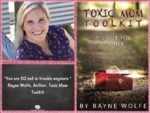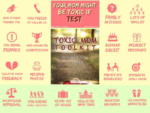Last updated on October 31st, 2019 at 12:31 am
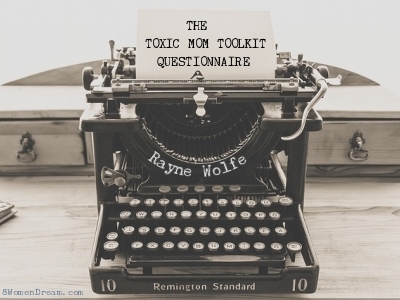 Part of my big dream effort to write my book, “Toxic Mom Toolkit: Discovering a Happy Life Despite Toxic Parenting,” includes gathering stories of other women who grew up with or are struggling with aging toxic-moms.
Part of my big dream effort to write my book, “Toxic Mom Toolkit: Discovering a Happy Life Despite Toxic Parenting,” includes gathering stories of other women who grew up with or are struggling with aging toxic-moms.
Early on, many friends offered their stories, and from time to time, readers offer their stories.
These stories help flesh out my understanding of what daughters of toxic mothers live through–and often triumph over–and how they make rules, they can live with when it comes to dealing with their moms. In anticipation of a meeting with my writing mentor, I’ve been reviewing my stack of daughters of toxic moms interviews. I realize I’m going to need more responses–a lot more.
When I interview women for this project, I use a one-page question sheet, which I’ve pasted at the end of this post. I’ve yet to ask every person every single question. Sometimes I already know that things don’t apply or learn during our conversation that a mother had died, so current relationship questions don’t apply. I give everyone the option of skipping a question or skipping several.
I’ve learned that to get authentic stories; women need complete freedom in the telling. I realize that a step-by-step questionnaire can be overwhelming emotionally or a great starting point if someone chooses to focus on one question and expound for pages, fine with me. My goal is to gather a wide range of information on the topic of how women deal with toxic mothers.
In my case, I know that my view of my mother changed as I matured.
Capturing a fluid, emotional story is a real challenge
I did a phone interview with the daughter of a toxic mom who had an incredible story. She was quick to point out that she wasn’t perfect, but she had been clean and sober for 13 years. Her current life included working with others in recovery. Her past life included stepping over strange men her mother brought home.
She had a great sense of humor. She could laugh as she told me she was once a little girl who stood in a bar doorway to ask her toxic mother for lunch money. Her story was amazing, yet what amazed me more was something she told me as we were saying our good-byes. She said that she follows my posts and prays for my book project while she drives because she knows it will help people.
Indeed, she speculated that a book like mine could theoretically help people not even born yet. Yeah, no pressure there!
So, I’m asking for women who have survived toxic mothers to consider being part of my process.
I’m asking for help
If you are a daughter of a toxic mother, please copy the questions below to a new page to complete, or highlight them and right mouse click to print, or use The Toxic Mom Toolkit Research Questions pdf. Fill in the answers and send them to me. To be clear, I’m asking you to send this questionnaire to me directly.
In the future, I will credit answers to initials, age, and home state only to protect everyone involved, and I hope to encourage real sharing. I will need to confirm that you are who you say who you are and that I’ve indeed had contact with you. I may also need to schedule phone interviews to flesh out individual stories.
One last thought. If it doesn’t make sense for you to participate and you know someone who might want to, please forward a link to this story to that person.
The Toxic Mom Toolkit Research Questions
1. Tell us about you. What year were you born, and where does your birth fit in among siblings? Please provide a basic description of your parents/family. Did your family grow through adoption or foster placement?
2. Describe the arc of your academic and professional life to present. What is your current occupation? If you volunteer in your community, how often? Doing what?
3. Describe the relationship with your mother in three segments: as a child, a teen, and a young adult.
4. How old were you when you first realized your mother was different than other mothers?
5. What is your biggest criticism of your mother?
6. What would she criticize about you?
7. Describe any significant periods of estrangement. How easy (or difficult) was it to limit (or cut off) contact?
8. How has your relationship with your mother affected your relationships with others?
9. How many friends can you really talk to about your mother?
10. Describe your current family status. Do you have children? If not, why not?
11. Describe your current relationship with your mother. Given your current levels of contact, how are you viewed within your family?
12. Have you ever talked to a therapist about your mother? Was it helpful?
13. Moving forward, do you anticipate any changes in your view of your mother?
14. Do you experience personal guilt, social guilt, or remorse about the decisions you’ve made regarding your mother?
15. As your mother ages, do you see yourself having more or less contact? Why?
Thank you for answering as many of these questions as possible. Please feel free to add any other comments to your responses. Be sure to include your contact information with your submission for any follow-up questions.
Rayne Wolfe
Even though Rayne Wolfe has now published her big dream book, Toxic Mom Toolkit, if you are a daughter of a toxic mother with a story to tell or feedback on how Rayne’s book helped you, we would be happy to publish your story on 8WomenDream. You can email us at dreamers(at)8WomenDream.com.
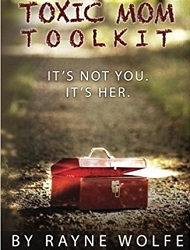 | 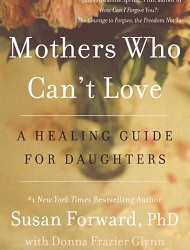 | 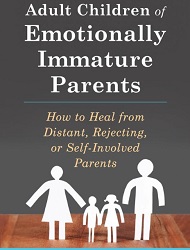 | 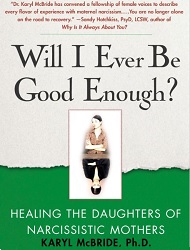 |
|---|

Enjoy this special 8WomenDream Guest Contributor story submitted by new and experienced big dreamers throughout the world, edited and published to capture a dream perspective from different points of view. Do you have a personal dream story to share with 8WomenDream readers? Click here to learn how to submit dream big articles for consideration.
Note: Articles by Guest Post Contributors may contain affiliate links and may be compensated if you make a purchase after clicking on an affiliate link.


